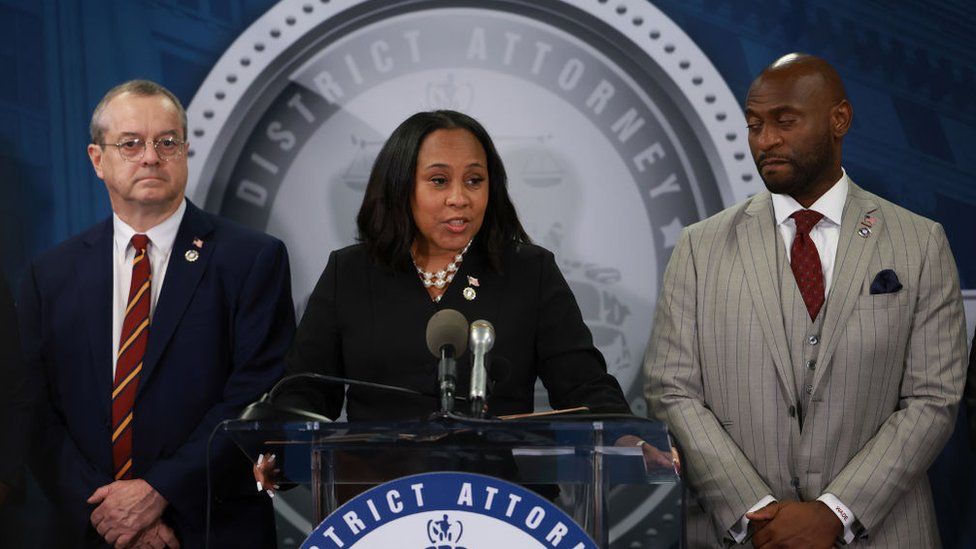Fani Willis: Georgia prosecutors in Trump election case admit relationship
- Published

Two Georgia prosecutors have rejected calls to take them off their election case against Donald Trump after acknowledging they had a relationship.
Fulton County District Attorney Fani Willis said conflict of interest claims were "salacious" and in "bad faith".
Nathan Wade, an outside prosecutor Ms Willis appointed to the case, said in an affidavit the pair had "developed a personal relationship" in 2022.
Mr Trump and co-defendants want them disqualified from the case.
Friday's filings were the first time the two prosecutors publicly acknowledged their relationship.
One of Mr Trump's co-defendants, Mike Roman, has alleged the two prosecutors had an improper relationship and benefitted financially from the arrangement.
The accusations threaten to undermine the prosecution of the former president and his allies for an alleged conspiracy to reverse Georgia's 2020 election results.
The former president seized on the admission, writing on Truth Social on Friday that "by going after the most high level person... she was able to get her 'lover' much more money".
In her filing, Ms Willis argues that they do not meet the threshold for disqualification under Georgia state law.
She has asked Judge Scott McAfee, who is overseeing the case, to reject legal efforts by defendants to remove her.
"The motions attempt to cobble together entirely unremarkable circumstances of special prosecutor Wade's appointment with completely irrelevant allegations about his personal family life into a manufactured conflict of interest on the part of the district attorney," she writes. "The effort must fail."
The judge has scheduled a hearing for 15 February to address the claims.
In his affidavit, Mr Wade denied that his compensation for working on the case was shared with Ms Willis.
He said he never cohabitated, shared household expenses, or shared a joint account with Ms Willis. Mr Wade also said "expenses for personal travel were roughly divided equally between us", and that they used personal funds for such expenses.
Ms Willis brought Mr Wade on board the investigation as a special prosecutor in 2021. Shortly afterwards, Mr Wade filed for divorce from his wife of two decades.
In January court filings, Mr Roman accused Mr Wade and Ms Willis of financially benefitting from an "improper, clandestine personal relationship".
He alleged Mr Wade profited "significantly" at "the expense of the taxpayers" and, by extension, so did Ms Willis. The filing accuses them of taking lavish trips together.
The document does not provide concrete evidence of these claims.
Mr Trump and another co-defendant, Bob Cheeley, have since joined Mr Roman's motion to disqualify the district attorney.
The defendants' allegations have played out in tandem with Mr Wade's divorce proceedings. His ex-wife, Joycelyn Wade, had filed a subpoena for Ms Willis to testify in their divorce.
The Wades settled their divorce on 30 January, shortly before a scheduled hearing.
If Mr Roman's efforts succeed, it would deal a serious blow to Ms Willis' case.
"A disqualification poses a real danger to the work done by the Fulton County DA's Office," Anthony Michael Kreis, a professor at Georgia State University College of Law, told the BBC.
The legal threshold to successfully remove Ms Willis and her office from the case over a conflict of interest is high, he said.
But if the defendants were successful, the entire Fulton County District Attorney's office would have to be removed from the case and another office appointed in their place, Prof Kreis said.
In that scenario, "it is possible that the trials proceed without any noticeable shifts in strategy," he said. "Or the new prosecutor could make light plea deals or even give up on the endeavour entirely."
- Published6 March
- Published15 March